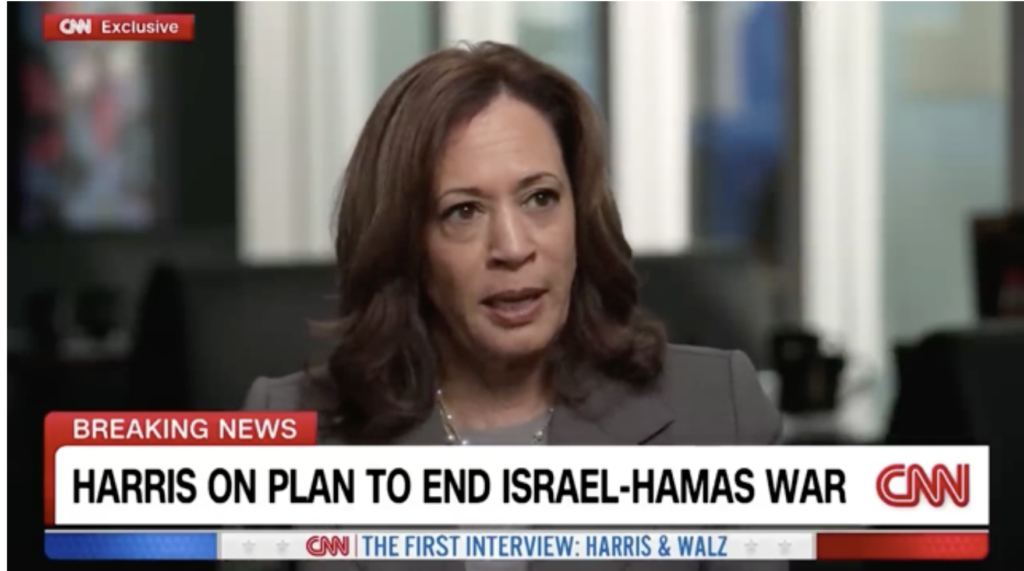What Kamala Harris Could Say and Do Before and After the Elections

By: Ghassan Rubeiz / Arab America Contributing Writer
Last week, Israel and Hamas agreed to a three-day pause in fighting to allow an international team to vaccinate over 640,000 Gazan children against polio. (There were more than just humanitarian issues at play, as a polio epidemic in Gaza would also have endangered unvaccinated Israeli troops.)
Diplomats hope that this pause may evolve into a ceasefire, allowing for an exchange of hostages for prisoners. The rising pressure on Netanyahu from the hostage families and their supporters may also help the negotiations. The discovery of six murdered Israeli hostages over the weekend fueled new levels of public demonstrations and led to a large if short-lived, labor strike. But it will likely take more than half a million protestors to pressure Netanyahu to sign a hostage deal and withdraw from the besieged territory.
Meanwhile, Israel has escalated its brutal attacks in the West Bank. As Israel expands and intensifies its oppression of Palestinians, it is deepening its insecurity by turning more civilian Palestinians into fighters.
While Netanyahu extends and expands the war, Washington is increasingly at a loss, unable to figure out where Israel’s war machinery is heading. The people of the Middle East are watching the American presidential election campaigns closely, hoping for a change in US foreign policy.
Last Thursday, CNN’s Dana Bash interviewed Kamala Harris, the Democratic presidential nominee. The vice president hewed close to President Biden’s Israel-Palestine policies, defensively repeating the usual platitudes: Israel has the “right to defend itself,” and Palestinians have the “right to self-determination.” But how far can Israel go in defending itself? How exactly are Palestinians to achieve self-determination? And should Israel be free to decimate Gaza and kill tens of thousands of civilians in the meantime?
It is politically dangerous for Harris to deviate too much from her current script until the November elections. Still, she could do more to acknowledge the situation’s complexity and show that she is seeking better outcomes. Here are a few points she could make:
- That exchange of captives is currently more important than Israel’s military goals in Gaza;
- That while a ceasefire is urgent, resolving the Palestinian issue means much more than just an end to the fighting;
- That rebuilding Gaza is unlikely to happen without an end to the violence in the West Bank;
- That resolving the Palestine question also means tackling Israel’s domestic political crisis;
- That the label “terrorism” should not be used to delegitimize any Palestinian resistance;
- That the United States is open to various models of statehood for Palestinians as long as freedom and equality remain cherished values;
- That the way forward is best determined through dialogue between all countries connected to the region, perhaps in the form of an international conference;
- That Arabs and Jews are not destined to remain adversaries forever: they are neighbors in a region threatened by forces that cut across their differences, such as desertification, infectious diseases, nuclear war, demographic pressures, and poverty.
These ideas are not meant to outline a new Mideast foreign policy; instead, they are new ways of thinking about coexistence in the Middle East. For Harris, some are perhaps best saved for after November, but Arab Americans should be raising them publicly: before, during, and after the election.
Ghassan Rubeiz is the former Middle East Secretary of the World Council of Churches. Earlier he taught psychology and social work in his country of birth, Lebanon, and later in the United States, where he currently lives. For the past twenty years, he has contributed to political commentary and delivered occasional public talks on subjects related to peace, justice, and interfaith. You can reach him at rubeizg@gmail.com
The views and opinions expressed in this article are those of the author and do not necessarily reflect the position of Arab America. The reproduction of this article is permissible with proper credit to Arab America and the author.
Check out our Blog here!









